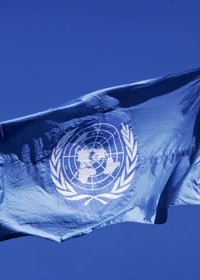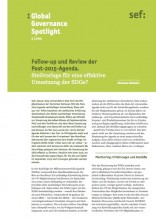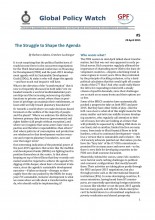
Nachhaltige Entwicklung und Menschenrechte
Global Governance Spotlight 5|2015
Seit Januar 2015 verhandeln in New York die Mitgliedstaaten der Vereinten Nationen (VN) die Post-2015-Agenda nachhaltiger Entwicklung. Diese soll aus vier Teilen bestehen: der politischen Erklärung (Declaration), den Zielen nachhaltiger Entwicklung (Sustainable Development Goals, SDGs), den Mitteln zur Umsetzung derselben (Means of Implementation, MoI) und dem Verfahren, wie eben diese Umsetzung nachvollzogen und überprüft werden soll (Follow-up and Review). Im Mai 2015 wurde der vierte Teil der Agenda diskutiert, der hier im Mittelpunkt steht und für den seit kurzem der [...]

What will we need to sustain the outcomes of the 3rd International Conference on Financing for Development?
The outcome document for the Third International Conference on Financing for Development (FfD3) is being finalized at the United Nations in New York. This is a key moment to make an assessment and influence the issues under negotiation to ensure progress is not lost in the interests of fact-tracking consensus. The outcome document must establish new ground on a range of issues such as combatting illicit financial flows and global tax cooperation.
Key to this is action on proposals of [...]
A Thinkpiece
Unlocking the post-2015 stalemate on international cooperation
The 3rd International Conference on Financing for Development
Global Policy Watch Briefing #5
By Barbara Adams, Gretchen Luchsinger
It is not surprising that the political battles have already become fierce in the concurrent negotiations for the Third International Conference on Financing for Development (FfD3) and the post-2015 development agenda with its Sustainable Development Goals (SDGs). At stake is who will shape the agenda—and how much real impact it will have.
What is the direction of the “transformation” that is now so frequently discussed in both talks? Are we headed towards a world of [...]
Seitennummerierung
- Vorherige Seite
- Page 38
- Nächste Seite


